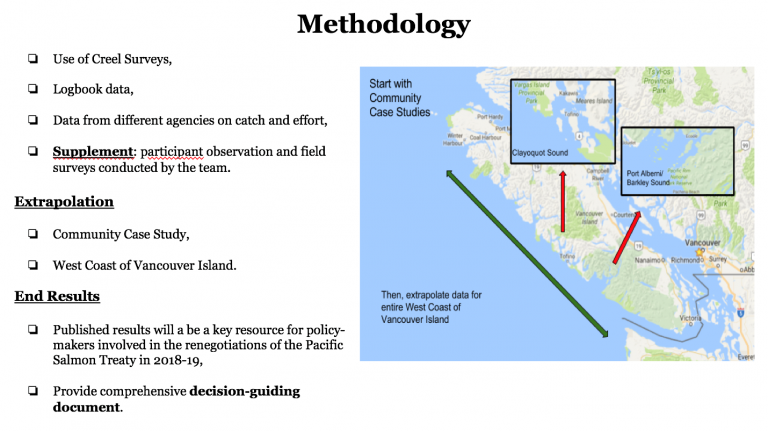Learn more from second year MPPGA student Raphaël Roman on his work on the “Enhancing Production in Coho: Culture, Community and Catch” Project and his recent presentation at the Clayoquot Salmon Roundtable in Tofino, B.C.


Synopsis of Clayoquot Salmon Roundtable Presentation
By MPPGA Student Raphaël Roman
Our presentation on the “Enhancing Production in Coho: Culture, Community and Catch” project at the Clayoquot Salmon Roundtable in Tofino went really well. We received positive feedback, as well as possible collaborations with other (pilot) projects that will be launched on the WCVI. Manifold stakeholders attended the Roundtable (see the full list here).
Undoubtedly, it was an enriching and valuable experience. It provided me with key leadership, team management and presentation skills, which will be useful within a professional context that requires a good understanding of the diverse array of vested interests present around the table. Having witnessed power dynamics between different groups of stakeholders (e.g. between the government and First Nations), it helped me to better grasp the social context at stake. Thanks to the role-play simulations offered in manifold courses during my first year and a half in the MPPGA program, I had the opportunity to practice such professional settings, in company with instructors that were eager to share their past experiences in the field.


Synopsis of the “Enhancing Production in Coho: Culture, Community and Catch” Project
By MPPGA Student Raphaël Roman
Since last summer, I’ve been working on a 4 year project named EPIC4, which stands for “Enhancing Production in Coho: Culture, Community and Catch.” To put it into context, historically, Coho salmon (Ts’uwit) has been a culturally and economically valuable part of several fisheries in British Columbia. In recent years, survival of juvenile Coho Salmon decreased to record lows, leading to a renewed call for improved strategies for wild and hatchery Coho Salmon management, and re-evaluation of wild-hatchery interactions.
To illustrate the rapid decline of Coho salmon population, the herein below graph depicts quite well the drop in catches across Canada during the 1990s, before the government of Canada (specifically the Department of Fisheries and Oceans DFO) decided to establish a moratorium in 1998, prohibiting any catches of Coho salmon. Nowadays, such a moratorium is still in place with regard to commercial fishing. At the local level, only First Nations fishing (that depend on Coho for ceremonial purposes) and recreational fishing are permitted, although for every fishing trip, recreational and subsistence fishermen are subject to strict quotas when it comes to retain their harvest of Coho Salmon.


In that sense, our project, which includes 5 teams across Canada (see different teams’ expertise and activity at http://www.sfu.ca/epic4/about.html), uses genomics (which does not entail any DNA modifications) in order to address challenges facing the safe, secure, and sustainable production of Coho Salmon. It is being funded by both Genome BC and Genome Canada.
-> The potential benefits of EPIC4 are significant:
1) Improved food and cultural security for First nations,
2) Enhanced employment and incomes in associated communities,
3) A sustainable Coho aquaculture industry in British Columbia,
4) And a rebuilt wild fishery with an effective hatchery system.
Our UBC team is focusing on socioeconomic well-being; namely, there are two groups of social scientists that look at and try to assess the EPIC4 genome technologies’ economic impacts/consequences upon First Nations and coastal communities. While a group in the Sociology department is targeting Knowledge Mobilization, my group at the Fisheries department is working on “Economic, Ecological, Cultural and Social Valuation of EPIC4 technologies”. See below one of our slides, summarizing the members of our team, as well as our case study’s objectives in recreational fishing.


Indeed, our current focus is a community case study in recreational fishing in the Clayoquot-Port Alberni’s area. As previous research to characterize the recreational fishery has been largely Provincial in scale and is now somewhat outdated, current economic and environmental impacts of the fishery at the local scale are not fully understood. Our study will thus address this gap by assessing the socioeconomic and environmental benefits of the recreational Coho fishery. Starting at the local scale with the area around Tofino, we are expecting to extrapolate our research to the whole West Coast of Vancouver Island. See another slide below with our methodology as well as final deliverables of the project; which are, inter alia, a comprehensive decision-guiding document for fisheries management agencies, aquaculture facilities and coastal community groups in an effort to take Coho Salmon off the endangered species list; while on the other hand, published results will be considered as a key resource for policy-makers involved in the renegotiations of the Pacific Salmon Treaty in 2018-19.


Learn more here.


